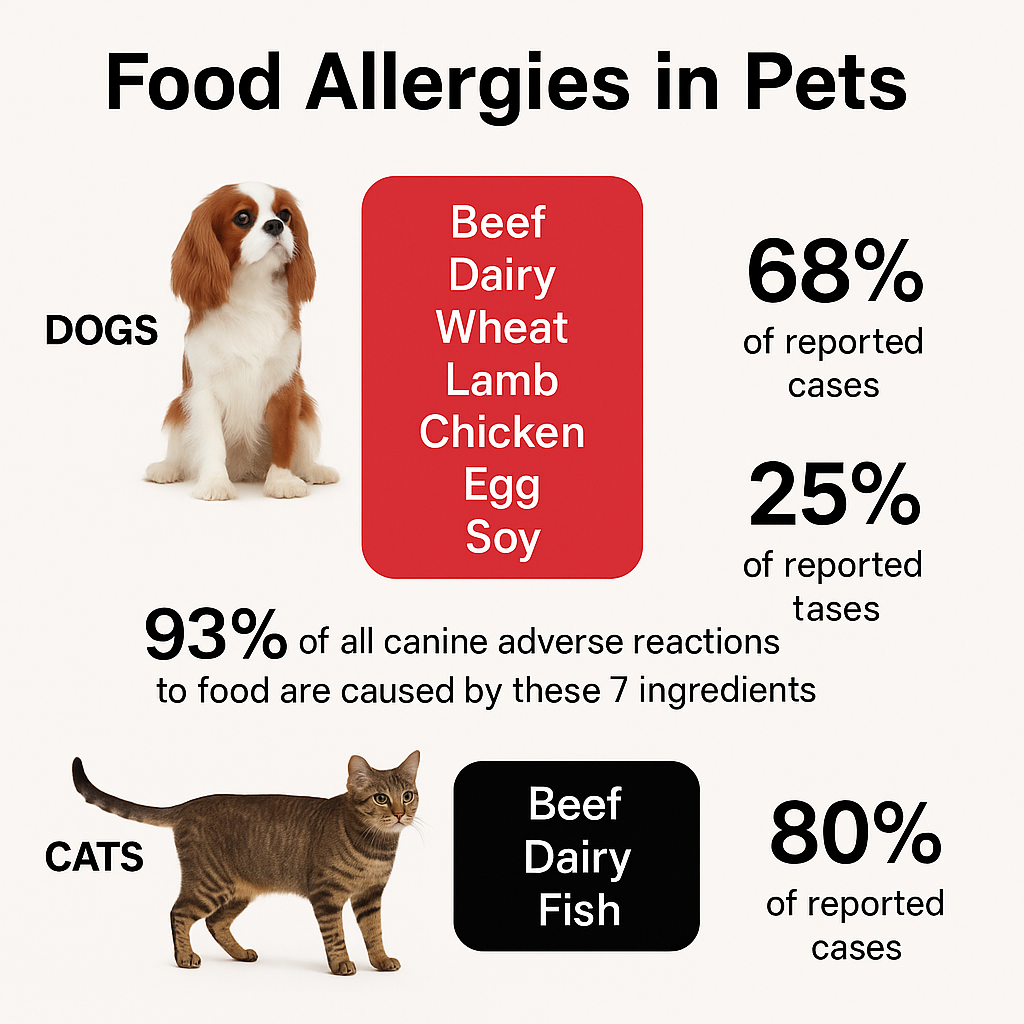How to Make a Simple DIY Food Allergy Recipe for Dogs
![]()

How to Manage Your Pet’s Allergies Through Diet: A Simple Approach
If you’ve been struggling with your pet’s allergies, chances are, you haven’t done a proper food trial yet. In this article, I’m going to walk you through a simpler way to handle your pet’s allergies—by focusing on their diet instead of relying on a slew of treatments for environmental allergies.
The Power of a Diet Change Over Treating Symptoms
I always tell pet owners that it’s far more effective to stop the scratching and itching by changing their pet’s diet than to rely on numerous medications for environmental allergies. By changing what your pet eats, you’re addressing the root cause of the problem, rather than masking the symptoms.
Of course, it’s important to manage the underlying inflammation that often accompanies these allergies. That’s where a natural supplement like curcumin comes in.
Curcumin: The Anti-inflammatory Solution
Curcumin, especially in a 95% concentration, has been shown to work wonders in reducing inflammation. This powerful compound comes from turmeric and has been proven to help with many conditions, including inflammatory skin diseases in pets. If your dog or cat is suffering from allergic reactions, adding curcumin to their routine can help manage those symptoms more effectively.
Dr. Jones’ Ultimate 95% Curcumin for Dogs and Cats
That’s why I’m so excited about our Dr. Jones’ Ultimate 95% Curcumin for Dogs and Cats. It’s a high-absorption supplement that has been a game changer for many pets dealing with inflammatory skin issues. Whether your pet is scratching from environmental allergies or other inflammatory conditions, this supplement can provide relief and support their overall health.


Rule Out Dog and Cat Food Allergy with a Food Trial
We all want the best for our furry friends, but sometimes food allergies can make life a little challenging for both them and us. Did you know that up to 15% of dogs and cats may suffer from food allergies? Let me walk you through how we can identify and rule out food allergies in our pets, using a simple food trial method.
Common Food Allergens in Pets

When it comes to food allergies in dogs and cats, the most common culprits are proteins. For dogs, these are typically beef, chicken, dairy, eggs, soy, and wheat gluten. But honestly, any food ingredient has the potential to cause an allergy. Other substances, like additives or preservatives, can also be responsible.
For our feline friends, beef, fish, chicken, and dairy are often the offenders, though allergies to soy, wheat, gluten, and even artificial coloring can also cause problems.
Commercial Diets: Are They Really Hypoallergenic?
You may have heard about hypoallergenic diets, but the truth is, no diet is completely hypoallergenic. The closest we get are hydrolyzed diets, which can be purchased through your vet. These diets break down protein molecules into tiny bits that are less likely to trigger an allergic response in your pet. However, even these diets can cause allergies in some pets, and they are not a one-size-fits-all solution.
How to Diagnose Food Allergies
Here’s the kicker—there’s no quick and easy test for food allergies. Sure, there are plenty of tests out there that claim to be able to diagnose food allergies, but I’ve found they’re not reliable. Blood, saliva, or even hair tests may not give you the answers you need.
The gold standard for diagnosing food allergies is something called a dietary elimination trial. Let me explain.
The Elimination Trial: A True Test
For a food trial to be effective, you’ll need to feed your dog or cat a diet that contains no ingredients they’ve ever eaten before. This means you must avoid all previous food, treats, and even supplements. No flavored vitamins, no parasite preventives—just the trial diet. This is the only way to accurately test whether food is the cause of your pet’s allergic symptoms.
If your pet’s symptoms improve on the trial diet, the next step is the food challenge. This involves reintroducing the old food back into their diet. If their symptoms return within a week, you’ve got your answer: your pet is allergic to that food.
Veterinary Diets: A Helpful Option
If you’re looking for a commercially available diet that can help with food allergies, hydrolyzed protein diets are your best bet. These diets, like Hill’s Prescription Diet z/d®, Royal Canin Hypoallergenic Hydrolyzed Protein®, or Purina ProPlan Veterinary Diets HA Hydrolyzed®, are formulated to minimize allergic reactions by breaking down protein molecules into smaller pieces that the immune system won’t recognize.
A Simple Homemade Food Trial for Dogs

If you prefer to try a homemade diet, here’s a simple recipe to help you get started:
Ingredients:
-
1 lb of chopped and cooked turkey
-
2 cups of cooked brown rice
-
2 cups of cooked kale or mixed veggies (frozen works too)
-
2 tablespoons of sunflower oil
-
1,000 mg of krill oil
-
1 teaspoon of calcium (optional for long-term use)
For a 50-pound dog, feed 2 cups twice a day.
A Simple Homemade Food Trial for Cats

For your feline companions, here’s a homemade food recipe:
Ingredients:
-
1 lb of chopped and cooked turkey
-
1 tablespoon of sunflower oil
-
1,000 mg of krill oil
-
500 mg of taurine
-
1 teaspoon of calcium (optional for long-term use)
For a 10-pound cat, feed ½ cup twice a day.
How Long Should the Food Trial Last?
For dogs, I recommend sticking to the trial for at least 6 weeks—ideally 12 weeks for the best results. In my experience, about 80% of dogs show improvement by 6 weeks.
For cats, you’ll want to extend the trial to a minimum of 8 weeks, but again, 12 weeks is ideal for more accurate results.
Stick with It for Success
Food allergy trials are tough. Our pets have a way of getting into things, which can make it hard to stay on track. But trust me—sticking to it is worth it. It’s one of the best ways to manage your pet’s allergies and improve their quality of life.
A Little Help from Supplements
While food trials are the main focus, I also recommend considering my Ultimate 95% Curcumin Supplement. This supplement contains curcumin, a powerful anti-inflammatory compound from turmeric. It helps reduce inflammation in your pet’s body, making them more comfortable as they go through the trial process.
Heal Your Pet at Home!
Best wishes for you and your pet’s health journey!

P.S. Food allergy trials aren’t easy, but I promise you, they are worth it. Stick with the process—it will help your pet in the long run!
Curcumin: The Anti-inflammatory Solution
Curcumin, especially in a 95% concentration, has been shown to work wonders in reducing inflammation. This powerful compound comes from turmeric and has been proven to help with many conditions, including inflammatory skin diseases in pets. If your dog or cat is suffering from allergic reactions, adding curcumin to their routine can help manage those symptoms more effectively.
Dr. Jones’ Ultimate 95% Curcumin for Dogs and Cats
That’s why I’m so excited about our Dr. Jones’ Ultimate 95% Curcumin for Dogs and Cats. It’s a high-absorption supplement that has been a game changer for many pets dealing with inflammatory skin issues. Whether your pet is scratching from environmental allergies or other inflammatory conditions, this supplement can provide relief and support their overall health.









